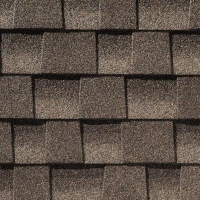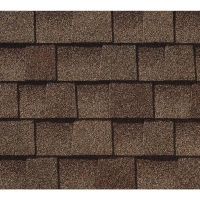I'm not sure whether this is off-topic; if so, I do apologize and will fully understand votes to close.
That said: I live in a climate that's quite cold much of the year but gets pretty hot in the summer, so I have both heating and cooling to worry about. I'm about to replace my roof and am trying to figure out how much difference the shingle color is likely to make.
I think — and please correct me if I'm wrong — that a lighter color will make daytime heating more difficult (in the winter) and make daytime cooling easier (in the summer), because it reflects more energy from light.
I also think — and again please correct me if I'm wrong — that a lighter color will make nighttime heating easier (in the winter) and nighttime cooling harder (in the summer), because it radiates less.
Main question: How significant are these effects? If I'm choosing between two shades of brown like these (the left one being a bit lighter than the right one), how much of a difference in energy consumption are we plausibly talking about over the course of the year?


Secondary question: I live in a place that's very cloudy most of the winter. Does that change the answer to the main question?
Additional info in case there are factors that don't scale in the obvious ways: The footprint of the house is 5000 square feet. With slopes, overhangs, etc., I'm guessing the roof is about 8000 square feet. The ceilings are very high (about 18 feet in most places.)
Best Answer
I'm fairly certain that the energy difference between the two is negligible. Any heat as a result of light absorbed is localized on the roof, with layers of insulation between the inside of your house and the additional heat generated. Most of the additional energy absorbed would heat up the air rather than the inside of your house. Additionally, the optical properties between the roofs seem very similar; I don't think one would absorb significantly more light than the other, just at slightly different frequencies.
A much more significant effect on energy consumption are your windows. In the summer, these let in almost all the light that hits them, which is converted into heat, inside your house. To mitigate this, they make windows with reflective coatings In the winter, your windows act as good heat conductors, cooling down your house. You'll sometimes see double-paned windows. The layer of air between window panes acts as an insulator.
They also design houses where the windows let in light in the winter, and block light in the summer, based on the orientation of the window and height of the sun in different seasons.